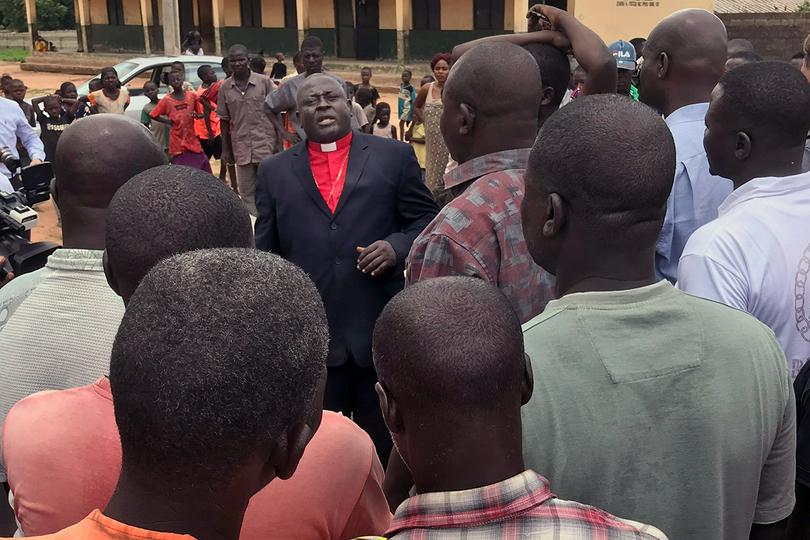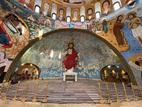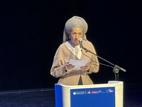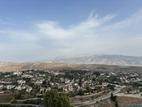Conflict among Nigerian United Methodists is hardly new but has escalated sharply in recent months.
Perhaps the clearest evidence of that came in June when two aides to Nigeria Area Bishop John Wesley Yohanna reported several clergy and laity to the police for allegedly causing disorder within the Nigerian United Methodist Church. The government pays close attention to the stability of the country’s churches and other institutions.
Four of those reported ultimately landed in jail on charges that they violated Nigerian security laws by sharing photos of themselves taken at the police station.
Among those who spent two nights in jail in Jalingo, Taraba State, Nigeria, was the Rev. Ande Emmanuel, who until recently was Yohanna’s administrative assistant. Yohanna announced in early May that he had replaced him and later appointed him to local church ministry, though Emmanuel said he was not consulted on the appointment and has not reported to it.
The falling out between Yohanna and Emmanuel reflects division among African United Methodists about their future in The United Methodist Church as it considers a formal split.
But the dispute has gone well beyond that, leading to public attacks and counter-attacks, official church complaints and counter-complaints - and to United Methodists reporting fellow United Methodists to the police.
Yohanna (a board member of United Methodist Communications, of which UM News is part) insisted during an hour-long Zoom interview that he had no role in that. But he said Emmanuel has disrupted the Nigeria Area, including making false accusations against him as bishop.
“Because of his (Emmanuel’s) ambitious desire to be bishop, he decided he would try to have me removed as bishop,” Yohanna said.
Emmanuel, who answered questions via Zoom and email, disputed that. He accuses Yohanna of punishing him and others committed to staying in The United Methodist Church, should the denomination divide.
And he scoffs at the idea that Yohanna was not behind the complaint to the police.
“Bishop Yohanna is using the resources of The United Methodist Church to jail United Methodist pastors,” said Emmanuel, who has been a contributor to UM News.
Tensions have grown so high that the West Africa College of Bishops plans to send a delegation to Nigeria soon to investigate and to meet with the opposing parties, said Côte d’Ivoire Area Bishop Benjamin Boni, who leads the college.
“The church’s problems cannot be dealt with in a haste but require prayer, reflection and dialogue,” he said. “We remain, therefore, in prayer for our brothers and sisters of the church in Nigeria.”
Nigeria is Africa’s most populous country, one with abundant natural resources and modern cities. But it also has high rates of poverty, widespread corruption and tremendous internal security problems owing to Boko Haram, conflict between Fulani herdsmen and farmers and, more recently, kidnappings for ransom.
“Nigeria by every stretch of the imagination in a political analysis, a security analysis, is on the verge of being a failed state,” said the Rev. Abraham Waywa, a Nigerian native who served as a defense analyst for the country before turning to ministry, and now leads the Central United Methodist Church in Brockton, Massachusetts.
The United Methodist Church in Nigeria consists of four annual conferences, with total membership of about 420,000, according to the latest published figures from the denomination’s finance agency.
United Methodism has grown in Nigeria, but amid infighting.
For example, Yohanna’s 2012 election as bishop was disputed, with some Nigerians challenging it unsuccessfully at the denomination’s Judicial Council.
The Rev. Philip Micah Dopah is among the Nigerian United Methodists who still do not accept Yohanna’s authority.
Dopah, under the title “director of connectional ministries,” leads what is in effect a second Southern Conference in the Nigeria Area, one that is not recognized by the official United Methodist denomination, and that second conference does not acknowledge Yohanna as bishop. Dopah claims large numbers of clergies and churches.
“We are fully part of the UMC. Our one and only problem is ‘Bishop’ John Wesley Yohanna,” Dopah said by email.
Yohanna and Dopah’s disputes over church properties have made the news in Nigeria and drawn the intervention of public officials, who have locked both sides out of a United Methodist sanctuary in Jalingo.
The conflict between Yohanna and Emmanuel surfaced a few months back, after several years of a seemingly close working relationship. The context includes a proposed split of The United Methodist Church, and the question of where Africa would land if that happens.
In early 2020, a diverse group of United Methodist leaders - responding to decades of internal division over how receptive to be to the phenomenon of homosexuality - presented the Protocol of Reconciliation and Grace Through Separation.
The plan would allow traditionalist United Methodist churches and conferences to leave and form a new denomination, with $25 million to get started. The Wesleyan Covenant Association, a traditionalist group within The United Methodist Church, has been busy planning for a new denomination and has chosen a name: Global Methodist Church.
But the COVID-19 pandemic has twice postponed the General Conference, the church’s top lawmaking assembly, so the protocol and other future-of-the-church legislative proposals remain on hold.
Yohanna is among the African leaders who have predicted that passage of the protocol would quickly cause the remaining United Methodist Church to jettison its longstanding bans on same-sex marriage and ordination of “self-avowed practicing” gay clergy as well as its official position that the practice of homosexuality is “incompatible with Christian teaching.”
In March, he said he would join the new traditionalist denomination if the protocol passes, and he indicated the Nigeria Area would go with him.
“We will not be a part of (a) UMC that will change the language of the Book of Discipline to accommodate same-sex marriage,” he said.
Meanwhile, Emmanuel has been a founder and leader of Africa Voice of Unity, a group of African United Methodists who strongly support staying in The United Methodist Church.
In February, Emmanuel and nine others issued a widely shared statement criticizing the protocol process as not having enough non-U.S. representation and arguing that The United Methodist Church’s growth in Africa, numerically and in mission work, ought to be celebrated and nurtured - not disrupted through a breakup.
“We join together seeking a successful future for our beloved church,” they said.
Africa Voice of Unity is championing the Christmas Covenant, another legislative proposal, which would allow for more regional autonomy in The United Methodist Church.
Emmanuel and his group foresee Africa being able to continue to observe traditionalist positions on marriage and ordination (homosexuality is, he points out, illegal in Nigeria and some other African nations) while still enjoying the benefits of longstanding ties in a connectional denomination.
Yohanna has been outspokenly opposed to the Christmas Covenant, as have traditionalist groups, arguing that the Bible does not sanction homosexuality and that a denomination cannot have more than one definition of marriage.
By early spring, Yohanna and his administrative assistant were very publicly at odds over Africa’s future in The United Methodist Church. And on May 5, Yohanna announced that he had replaced Emmanuel.
The split may already have turned personal. It certainly became public.
For example, on May 17, the Africa Voice of Unity posted complaints on its website against Yohanna from three Nigerian conferences, alleging he has punished clergy wanting to stay in The United Methodist Church, used United Methodist funds to promote the Global Methodist Church, discriminated against women clergy in appointments and failed in financial accountability and management of certain mission projects.
Yohanna’s opponents have also shared those complaints with his fellow bishops, church agency leaders and others.
However, other local leaders have come out in Yohanna’s defense. The Rev. Yayuba Bazel Yoila, conference administrative assistant to the bishop for the Southern Nigeria Conference, has written that, “The petitions Rev Ande Emmanuel filed against Bishop John Wesley Yohanna … it has no substance, is baseless, unfounded petitions that lack merit (sic).”
The Rev. Nuhu Haruna Pitiko, conference secretary for the Central Nigeria Conference, has disputed many of the claims in the complaints shared by Africa Voice of Unity. He has written that “some people are embarking on a campaign of calumny” against the bishop.
An official complaint against Emmanuel has made the email rounds as well, alleging he is disrupting the order of the Nigerian United Methodist Church, and encouraging churches not to pay apportionments to the Yohanna administration.
Both Yohanna and Emmanuel, in interviews with UM News, forcefully denied the respective allegations against them.
Yohanna noted that much of what he has been accused of occurred while Emmanuel was working at his side.
“He was active in all these transactions,” Yohanna said.
Emmanuel said he challenged Yohanna behind the scenes, but served him loyally. Now, though, he said Yohanna “looks at me like a traitor.”
“He sees I am not going to follow him to the Global Methodist Church,” Emmanuel said.
The conflict’s inflection point came in early June, when two conference administrative assistants to Yohanna - Yoila and the Rev. Yunusa Z. Usman - wrote to Nigeria’s Taraba State police commissioner, accusing Emmanuel and several others of disrupting the Nigerian United Methodist Church and training other United Methodists to become “rude and aggressive” towards the bishop.
Nigeria constitutionally guarantees freedom of religion, but government interference with religious groups has been a trend, as has religion-related violence, said David W. Scott, director of mission theology at United Methodist Global Ministries.
“Much of that conflict is related to tensions between Christians and Muslims, but conflict among other religious groups also sometimes erupts, drawing the government in,” Scott said.
The Taraba State police asked Emmanuel and a handful of others to come for an inquiry, and they did so around June 8-9.
Yohanna told UM News that he was traveling when the two conference administrative assistants contacted the police, and knew nothing about it. Once informed, Yohanna said, he had his new top aide send a note to the police, asking the complaint be withdrawn.
Yoila, in an email, supported the bishop’s account. A police spokesman told local Nigeria reporters that the bishop had not contacted police.
But Emmanuel said he is certain from his experience with Yohanna’s staff that no aides would take such an action without Yohanna’s direction.
The Rev. Ahmed Ayuba Ahmed, another of the United Methodists questioned by the police, agreed.
“Bishop can never exonerate himself in this,” he said by email. “He was the principal actor (sic).”
A further disagreement is over whether Yoila and Usman came to the inquiry and told police that Emmanuel and the others had been promoting and even engaging in the practice of homosexuality.
Emmanuel, Ahmed and Nicodemus Heman, a United Methodist layman called to the police station, said in separate interviews that they witnessed that.
But Yoila, in an email, described that assertion as “LIES,” insisting his response be kept in capital letters.
Photos of Emmanuel and his group at the police station - taken by themselves or supporters, and meant to document their experience - quickly got shared, apparently with the West Africa College of Bishops and the Council of Bishops, and with someone forwarding them to the police.
On June 9, Emmanuel, Ahmed, Heman and the Rev. Ignatius Jesse returned to the police station and faced questions about whether taking and sharing the photos violated Nigeria’s secrecy law (United Methodists in the U.S. who have traveled to Nigeria told UM News that Nigerian authorities are, because of the country’s security challenges, typically vigilant about not allowing photos near checkpoints or police stations).
In this case, police were concerned enough that Emmanuel, Ahmed, Heman and Jesse had to go to court on June 22 and face accusations of spying. Their hearing was continued until June 24, and a magistrate initially denied bail, according to local news reports.
So the three pastors and Heman spent the nights of June 22-23 at the National Correctional Center.
Heman said, “As a patriotic citizen in Nigeria, I have never been to jail. This is my first experience. As an asthmatic patient, I find it very terrible to sleep in one room with 61 others without ventilation.”
Ahmed described a crowded, foul-smelling space, shared with people facing a range of charges, some of them for violent crimes. But he said he and his colleagues prayed for and witnessed to others.
“This was my consolation behind bars,” he said through email.
The four United Methodists were released on bail on June 24, with their next court appearance set for July 19. Though local media have focused on the spying angle, Emmanuel, Ahmed and Heman all said they still face the original complaint of disrupting The United Methodist Church in Nigeria.
As for the alleged spying, Ahmed said: “How can you invite someone into your facility because somebody has a complaint against me, and you turn and call me a spy? How is taking pictures in public places an offense? Why didn’t they arrest us while we were taking pictures?”
Emmanuel provided UM News photos of Nigerian United Methodists holding a street demonstration in support of him and the others when they were in jail.
More recently, a GoFundMe effort to provide legal representation and other support has raised about $3,300, including $500 from the Rev. Adam Hamilton, senior pastor of the United Methodist Church of the Resurrection, in Leawood, Kansas.
“I am hopeful that United Methodists across the divide can agree that these pastors and laity should not be incarcerated for supporting the Nigerian UMC remaining part of The United Methodist Church, just as those leaving to join the new Global Methodist Church should not be detained by the police,” Hamilton said by email.
Some other U.S. pastors say their mission work in Nigeria has given them strong confidence in Yohanna.
“I trust Bishop Yohanna both as a leader and a Christian,” said the Rev. Robert Sparkman, a North Alabama Conference pastor, recently retired, who has made a handful of mission trips to Nigeria. “He has always fulfilled our partnership agreements and in doing so has helped his church.”
But Sparkman added that he did not know the details of the current controversy. He also questioned any North American’s ability to fully understand the complexities of The United Methodist Church in Nigeria.
Last week, a Nigerian lawmaker who is a United Methodist met with Yohanna and some of those close to him, and met separately with Emmanuel and some of his team, and then got both sides together, Emmanuel said.
There was an agreement that the lawmaker would go with Usman and Yoila to withdraw their complaint to the police, but the withdrawal had not happened as of late this week - again, according to Emmanuel.
Emmanuel said he, Ahmed, Ignatius and Heman are still set to be back in court on July 19.
Yoila insisted in a July 17 email that the complaint brought by him and Usman had been withdrawn.
As for the West Africa College of Bishops sending a team to Nigeria, Emmanuel is strongly supportive.
“It is very important they do this promptly,” he said. “As it is now, many things are stuck in the church in Nigeria.”
In the interview UM News did with Yohanna in late June, he said he too would be fine with such a visit.
The bishop added: “I’m leaving most of this to God. God is aware of all that is going on. And God is a true judge.”
Originally from: United Methodist News Service
CCD reprinted with permission












